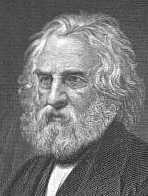WALTER VON DER VOGELWEID
by
Henry Wadsworth Longfellow
Vogelweid the Minnesinger,
When he left this world of ours,
Laid his body in the cloister,
Under Wurtzburg's minster towers.
And he gave the monks his treasures,
Gave them all with this behest:
They should feed the birds at noontide
Daily on his place of rest;
Saying, "From these wandering minstrels
I have learned the art of song;
Let me now repay the lessons
They have taught so well and long."
Thus the bard of love departed;
And, fulfilling his desire,
On his tomb the birds were feasted
By the children of the choir.
Day by day, o'er tower and turret,
In foul weather and in fair,
Day by day, in vaster numbers,
Flocked the poets of the air.
On the tree whose heavy branches
Overshadowed all the place,
On the pavement, on the tombstone,
On the poet's sculptured face,
On the cross-bars of each window,
On the lintel of each door,
They renewed the War of Wartburg,
Which the bard had fought before.
There they sang their merry carols,
Sang their lauds on every side;
And the name their voices uttered
Was the name of Vogelweid.
Till at length the portly abbot
Murmured, "Why this waste of food?
Be it changed to loaves henceforward
For our tasting brotherhood."
Then in vain o'er tower and turret,
From the walls and woodland nests,
When the minster bells rang noontide,
Gathered the unwelcome guests.
Then in vain, with cries discordant,
Clamorous round the Gothic spire,
Screamed the feathered Minnesingers
For the children of the choir.
Time has long effaced the inscriptions
On the cloister's funeral stones,
And tradition only tells us
Where repose the poet's bones.
But around the vast cathedral,
By sweet echoes multiplied,
Still the birds repeat the legend,
And the name of Vogelweid.

|
|
Sarah R Voglewede at the tombstone of Walther von der Vogelweide
in Würzburg, Germany. This tomb is described in Longfellow's poem,
The Song of Walther von der Vogelweid. Visible on the top of the
tombstone, here covered with flowers, are two dish-shaped depressions where
birdseed could be placed. Barely visible on the front of the tomb is the
name Vogelweide.
|
Return to the
Voglewede History Page

